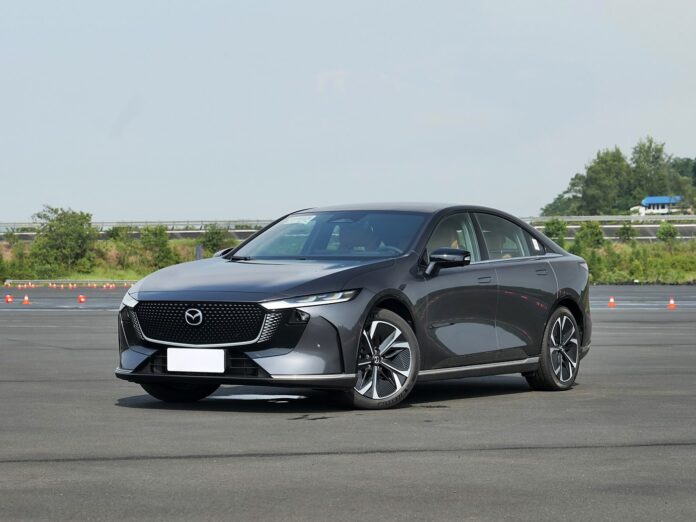On September 28, the Mazda EZ-6 officially opened pre-sales for both the fully electric and EREV versions of the car, which was jointly developed by Mazda and its JV partner Changan. The actual price is quite fuzzy, with it being quoted purely as 160,000 to 200,000 yuan (22,800 – 28,550 USD). However, four EREV versions, along with three fully electric versions, were announced at the pre-sales launch.
Although visually similar to the Deepal SL03 and L07 sedans to which the Mazda EZ-6 is related, the Mazda still manages to carve out some form of unique identity for itself. Most notably, it is a different size from either of the Deepal models. The Mazda measures 4921, 1890, and 1485mm (l/w/h) while the wheelbase is 2895 mm. This makes the Mazda larger than the SL03 (see specs) and the larger L07 despite having a five-millimeter shorter wheelbase.
At the front, the EZ-6 has a Mazda-like grille, and the headlights have a split structure. The main lights are hidden under the daytime running lights. Mazda refers to the LED light group as the Wings of Light, and reportedly, the Mazda logo can also be illuminated.



From the side, the car has a quite sporty stance with a coupe-type look. The rear ends in what looks like a fixed ducktail spoiler, but this is actually electrically actuated at speeds above 90 km/h. The rear light clusters are similar to those on a number of other Mazda vehicles, and it also features a through brake light.
Earlier this month, the Deepal L07 launched, and conspicuously absent inside was an instrument panel. The Mazda EZ-6 more closely follows the lines of the Deepal SL03 and is, therefore, equipped with an instrument panel and a 14.6-inch infotainment screen. Furthermore, there is a 50-inch augmented reality heads-up display. A Qualcomm Snapdragon 8155 chipset controls the car’s cockpit systems.




Even the base version of the car gets leather upholstery, and higher trim versions splice leather and suede together. The car comes equipped with a 14-speaker Sony audio system, 64-color ambient lighting, front zero-gravity seats, which means that the seats can recline to a near-flat position, and the cockpit supports 13 scene mode switching. There is also a non-opening panoramic roof.


The drive selector is on a stalk mounted on the steering wheel column, which frees up space on the center console. Although there is space for two phones, only the space closest to the driver appears to support wireless charging.
The EV uses a 190 kW MSED04 electric motor on the rear axle with a choice of either a 56.1 kWh or 68.8 kWh battery pack giving a range of 480 km or 600 km, respectively. Batteries are lithium iron phosphate and can charge from 30% to 80% SoC in 15 minutes.
Providing range extension in the EREV is a 1.5 litre JL473QJ engine with maximum power of 70 kW. Power to the actual wheels, though, comes from a 160 kW electric motor. Depending on the battery pack range is either 130 km or 200 km and the comprehensive range is 1,301 km. The EREV can charge from 30% to 80% in 20 minutes.
The Mazda EZ-6 claims to have L2.5 driving assistance. This, however, seems to be largely just an intelligent cruise control system.
Source: Autohome


